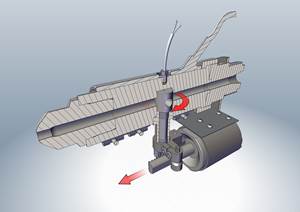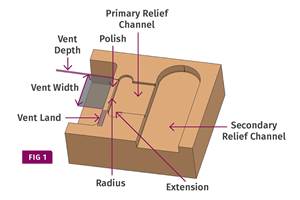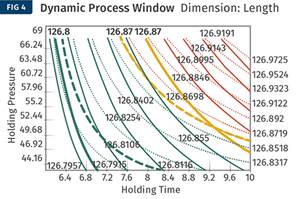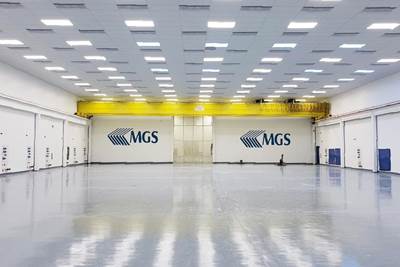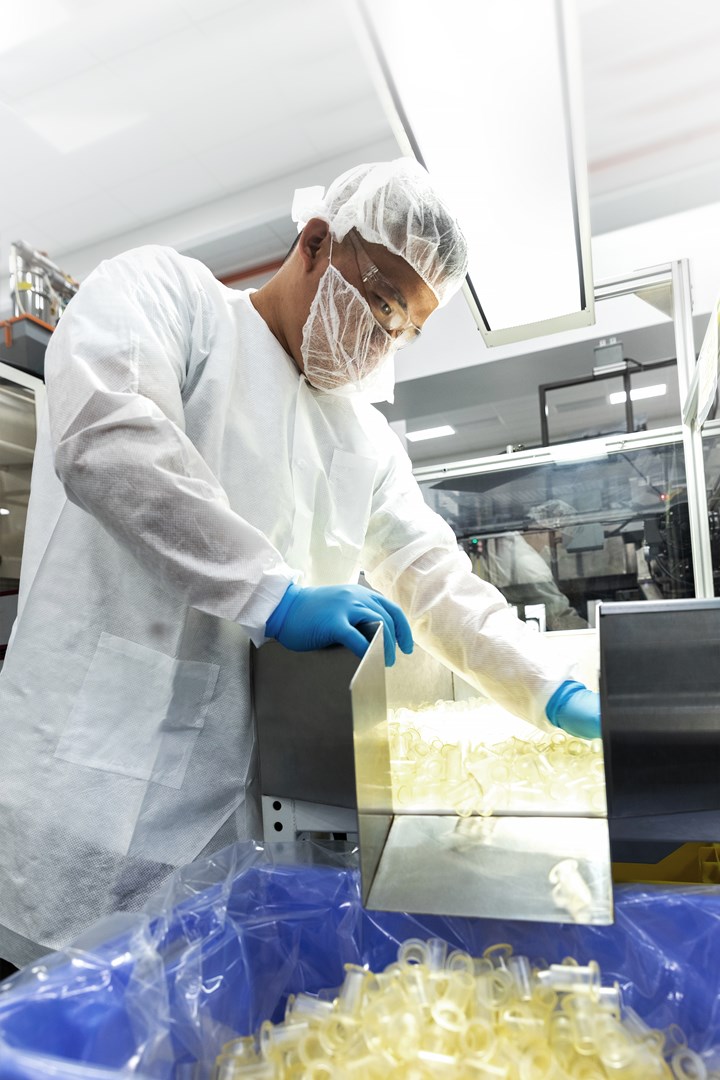
MGS employs approximately 300 at its Germantown headquarters, with plans to add 40 more staff in 2020.
The coronavirus pandemic has exerted an unprecedented stress test on nearly every aspect of the U.S. economy, including plastics manufacturing. In the earliest days, machines idled from normal business paused by the outbreak, were rapidly repurposed for making whatever products could help right now, whether it was personal protective equipment (PPE) for frontline medical personnel or valves for much-needed hospital ventilators.
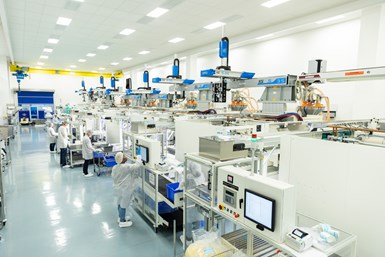
MGS Manufacturing’s Healthcare Center of Excellence, including its ISO Class 8 cleanroom, made it uniquely suited to tackle molding of components for COVID-19 test kits.
By the start of April, the immense scale of the challenge facing the country, and what plastics manufacturing’s role would be in rising to that task, began to come into focus. “Everyone knew that in order to have containment and not keep the country shut down—to have a more strategic approach to the outbreak—we needed information; we needed data; and we needed much, much more testing,” says Paul Manley, president of MGS Manufacturing, Germantown, Wis.
At that time, as the coronavirus pandemic pushed towards an initial apex in cases and deaths, MGS Manufacturing shifted from supplying tooling to a competitor for a new rapid molecular-level test kit for COVID-19 to taking a sizable portion of the moldmaking and injection molding for the project in-house. Founded in 1982 as Moldmakers Inc., the Wisconsin-based company that is now global with operations in Europe and Mexico has expanded into injection molding and custom automation, with a specialization in two-shot molds and molding and medical manufacturing. That amalgam of abilities put MGS in a special position help ramp up production of urgently needed test kits.
“Our customer, who was familiar with MGS and our unique capabilities, saw us as a perfect partner to help scale these components,” Manley explains. “I say unique capabilities because there are a lot of really good toolmakers in the United States and a lot of really good injection molding companies. There are also a lot of companies that build automation, but at MGS, our integrated solution, our unique value proposition, is that we do all three.”

Testing Times
Since the outbreak took hold in the U.S., coronavirus testing has ramped up continuously, but the gap between where things stand and where they need to be, according to public health experts, remains wide. In April, when MGS first became involved, a daily average of just over 173,000 tests were being performed in the U.S. according to the COVID-19 tracking project. In May, that figure doubled to more than 343,000 tests/day—rising to 391,173 average daily tests over the last two weeks of the month. Given the size of the U.S. population—328 million people—and the extent of the outbreak here, Harvard’s Global Health Institute said the U.S. should be doing more than 900,000 tests per day.
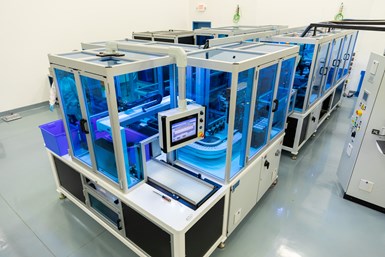
MGS Manufacturing’s automation capabilities, paired with its injection molding and moldmaking capacity, came to play in it taking on the Covid-19 test kit job.
If the country ever gets to that last figure—theoretically completing 27.9 million tests in a month—it will be by virtue of the efforts of manufacturers like MGS and the suppliers that support them.
As of June 1, 17.6 million tests had been completed in the U.S.—a staggering figure when considering the sheer volume of molded components required. The total number of individual tests created and completed in just a few months were equivalent to light-vehicles sales in the country for an entire year. Additionally, this output was for a wholly new line of products requiring new tooling and validation, with a ramp-up of just weeks rather than months.
“Several of the parts are multishot components, adding another layer of complexity. I wouldn’t classify any of the parts as simple open-and-close molds.”
“These are complex plastic parts,” Manley says. “We all understand the urgency of getting these to market, and in a suite of tools where lead times would typically be 18 to 20 weeks, we’re building them in six to eight weeks.” Manley says this testing kit, for which MGS cannot reveal the OEM, was on market, but it needed to be scaled up “exponentially.”
“The ability to take something designed for half a million or a million tests per month and scale it to 5 to 10 million tests per month—in a very compressed time frame—is a challenge,” Manley says, with considerable understatement.
18 New Molds & Millions of Parts
MGS is limited in the specific information it can share about the individual elements of the project, but generally speaking, the job involves a number of components molded by MGS in tooling it is building. These components are then sent to the customer for assembly into a single-use consumable, including the reagent. After introduction of the patient’s sample, the consumable is inserted into the testing instrument. “Several of the parts are multishot components, adding another layer of complexity,” Manley says. “I wouldn’t classify any of the parts as simple open-and-close molds.”
Ultimately, MGS signed on to build 18 injection molds, eight of those being multicomponent tools, by mid-July, giving the company approximately 10 weeks from project launch to sample parts from new molds with a streamlined validation process. The monumental moldmaking task was made possible by employees working 60- to 70-hr weeks and instituting split shifts in the toolroom to maximize equipment usage.
“I’ve been a part of MGS for 24 years now, and truly, I’ve never been more proud to be a part of the organization than in the last couple of months.”
As the molds are being completed, MGS is staging 18 injection molding machines in its ISO Class 8 cleanroom into a sort of “super cell” to allow coordinated molding of the components. The plan is to be in mass production by mid-September. When that time comes, Manley anticipates the monthly volume of individual parts for this project to be in the range of 12-15 million.
MGS’ ability to take on a project of this scale is a direct result of recent investments. In June 2019, the company announced an injection of $20 million into its Germantown headquarters, expanding its cleanroom molding with a new 13,000-ft2 Class 8 space that is the heart of its new Healthcare Center of Excellence. That new cleanroom houses 20 injection machines, ranging in clamp force from 160 to 650 tons, and it joins existing cleanrooms in Germantown that covered 15,000 ft2 and 6500 ft2, respectively. MGS has more than 100 molding machines and 300 employees in Germantown, and despite broader market difficulties, it anticipates hiring 40 new employees in 2020.
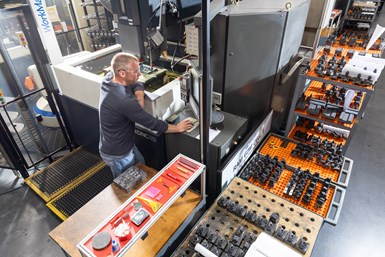
To complete the 18 new molds required for the COVID-19 test kits, MGS’s toolroom saw employees working 60-70 hr weeks with split shifts instituted to maximize equipment usage.
Plastics Manufacturing Pride
The breakneck pace of the project, paired with the underlying challenge of running a complex manufacturing operation in the midst of a pandemic, could prompt many responses, but there has been one overriding sentiment for Manley.
“I’ve been a part of MGS for 24 years now,” Manley says, “and truly, I’ve never been more proud to be a part of the organization than in the last couple of months, seeing how so many people have responded so admirably.”
That pride extends to the broader U.S. manufacturing base, which leapt into action to address the outbreak from the very beginning. “Whether it be transport tubes and caps for sample collection for testing or these rapid test kits,” Manley says, “all of it has been a testament—and I’m sure this is what many companies are seeing—but a testament to the great work that U.S. manufacturers do here.”
“If we can share best practices, if we can learn from what they’ve done, or they can learn from what we’ve done and get to market faster, great, let’s do that.”
That work, in many ways, is just getting started. The continued need for personal protective equipment, testing, and components related to vaccine development and manufacturing, mean plastics’ role in responding to this crisis is just getting started.
“We certainly have a common enemy here,” Manley says. “This isn’t about the competitive nature of tooling organizations or plastics companies; we do have a greater good to serve here. There’s a cadence of meetings where all partners are on the phone and are sharing all information in order to make sure another partner doesn’t have to go through the same hurdles we have. If we can share best practices, if we can learn from what they’ve done, or they can learn from what we’ve done and get to market faster, great, let’s do that.”
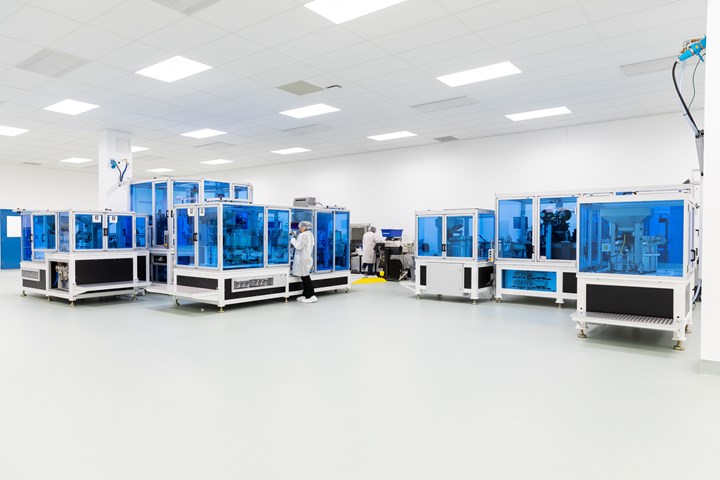
MGS’ capabilities include the creation customized automation cells to support its own and outside manufacturing.
Related Content
Process Monitoring or Production Monitoring—Why Not Both?
Molders looking to both monitor an injection molding process effectively and manage production can definitely do both with tools available today, but the question is how best to tackle these twin challenges.
Read MoreKnow Your Options in Injection Machine Nozzles
Improvements in nozzle design in recent years overcome some of the limitations of previous filter, mixing, and shut-off nozzles.
Read MoreBack to Basics on Mold Venting (Part 2: Shape, Dimensions, Details)
Here’s how to get the most out of your stationary mold vents.
Read MoreOptimizing Pack & Hold Times for Hot-Runner & Valve-Gated Molds
Using scientific procedures will help you put an end to all that time-consuming trial and error. Part 1 of 2.
Read MoreRead Next
MGS Creates Healthcare Center of Excellence in Wisconsin
The supplier of tooling, molding and assembly equipment is investing $20 million in its Germantown site, adding a Class 8 cleanroom and 20 presses, while consolidating its Illinois molding operations.
Read MoreBeyond Prototypes: 8 Ways the Plastics Industry Is Using 3D Printing
Plastics processors are finding applications for 3D printing around the plant and across the supply chain. Here are 8 examples to look for at NPE2024.
Read MorePeople 4.0 – How to Get Buy-In from Your Staff for Industry 4.0 Systems
Implementing a production monitoring system as the foundation of a ‘smart factory’ is about integrating people with new technology as much as it is about integrating machines and computers. Here are tips from a company that has gone through the process.
Read More

























